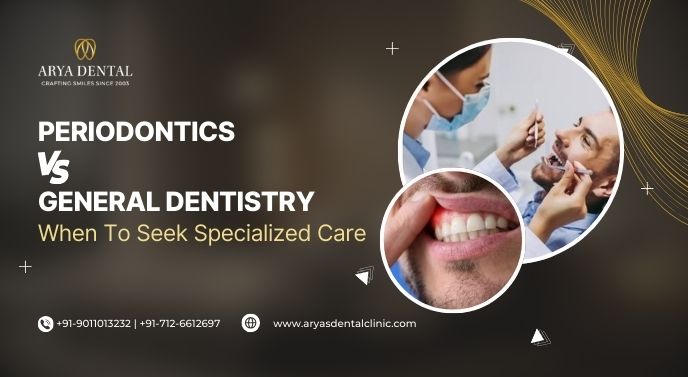
Periodontics and general dentistry have different but complementary functions in dental care. Periodontists specialize in managing gum health and advanced disorders that damage the supporting structures of your teeth, whereas general dentists handle basic maintenance and preventive treatments. It's critical to understand when to see each kind of dentist since specialist care can offer focused solutions to prevent and treat complicated oral health problems. These distinctions and the appropriate times to seek expert care will be discussed here.
What is General Dentistry?
The cornerstone of oral care is general dentistry, which takes care of both preventative and routine dental requirements. General dentists offer a variety of services to preserve oral health, such as:
- Regular examinations and cleanings to monitor oral health and prevent plaque accumulation.
- Cavity fillings and tooth restoration techniques.
- X-rays, dental examinations, and preventative measures, including sealants and fluoride treatments.
General dentistry is a crucial component of dental care. Routine checkups with a general dentist can help identify issues early and treat them before they worsen.
What is Periodontics?
The dental specialty of periodontics concerns the gums, bones, and ligaments supporting the teeth. Experts in identifying and treating gum disease, particularly in complicated situations, are periodontists. Typical periodontal therapies consist of:
- Use a deep cleaning (scaling and root planing) to remove plaque and tartar under the gum line.
- Gum grafting and periodontal surgery treat recession or severe gum disease.
- Implant placement and bone grafting, particularly in cases where gum disease has caused bone loss.
When gum problems need more sophisticated care than a conventional dentist can offer, patients are usually referred to a periodontist.
Signs You May Need Specialized Periodontal Care
When certain symptoms occur, it's time to seek expert care from a periodontist. These consist of:
- Gums that continue to bleed, swell, or feel sore even after brushing or flossing.
- Sensitivity and recession of the gums at the gum line.
- Halitosis, or persistent foul breath, doesn't go away with consistent dental care.
If you don't get timely treatment, these symptoms may worsen and impact the condition of your teeth and gums. If these symptoms show up during normal examinations, general dentists may recommend that patients see a periodontist.
The Role of General Dentistry in Preventing Periodontal Issues
With routine examinations and cleanings, general dentists are essential in preventing periodontal disease. They can identify early indicators of gum disease and take appropriate action by offering preventive care, which includes:
- Instruction on how to avoid plaque buildup by brushing and flossing properly.
- Regular cleanings lower the chance of gum inflammation.
- Early gum disease screening can help prevent more involved treatment later on.
Seeing a general dentist regularly will help you keep your gums healthy and avoid the need for more involved procedures later on.
Benefits of Seeing a Periodontist for Gum-Related Concerns
A periodontist provides specialized abilities to manage gum problems that become more complicated. Visiting a periodontist has several benefits, including the following:
- Advanced instruction in the management of gum disease for accurate and efficient care.
- Specialized instruments and methods for treating gum infections include laser therapy.
- Comprehensive treatment to maintain gum health and stop tooth loss.
When to Consult Both: Collaborative Care Between General Dentists and Periodontists
Periodontists and general dentists frequently collaborate to deliver the best possible care. The following circumstances make collaborative care advantageous:
- Gum preparation for restorative treatment like crowns or bridges.
- Periodontists, including joint care, treat the gum and bone structure during dental implant treatments.
- Continuous care for those with a history of gum disease.
Since periodontists handle advanced gum health and general dentists handle routine needs, collaborative care guarantees thorough treatment.
How to Decide Which Care Is Right for You
Assessing your symptoms is necessary to determine the appropriate care for you. A general dentist may frequently treat mild to moderate gum disease, but a periodontist should be seen for more serious gum symptoms, such as severe bleeding or noticeable gum recession. The best course of action is typically to consult your regular dentist first, as they can assess your condition and make referrals as needed.
Making educated decisions regarding your dental health can be facilitated by knowing the distinctions between periodontics and general dentistry. While specialized care from a periodontist can address more severe disorders when necessary, routine dental visits to a general dentist are essential for keeping healthy teeth and gums. Make an appointment for a regular examination with your general dentist if you have any concerns about the health of your gums, and then take the necessary precautions to keep your smile safe.